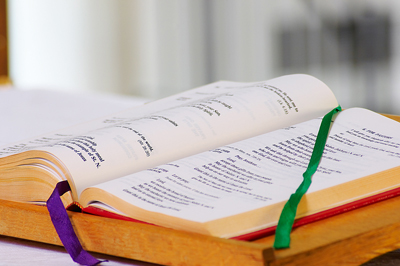
 GREENVILLE—The liturgy is what really touches people’s lives, but it isn’t always used to its fullest potential, Father Michael Driscoll said. He spoke to a group of about 40 at Furman University on the impact of good liturgy, which he said brings out all of the church’s rituals and symbols and applies them in a more meaningful manner.
GREENVILLE—The liturgy is what really touches people’s lives, but it isn’t always used to its fullest potential, Father Michael Driscoll said. He spoke to a group of about 40 at Furman University on the impact of good liturgy, which he said brings out all of the church’s rituals and symbols and applies them in a more meaningful manner.
Father Driscoll, founding director of the University of Notre Dame’s master of sacred music program, delivered the 2010 Hesburgh Lecture at Furman’s Daniel Chapel.
He said the liturgy should assume the feel of a performative art.
“Liturgy is an art which uses the other art forms,” he said. “The liturgy is an artful activity.”
He described it as more than words on a page.
“If I show you a liturgical book, that is not liturgy,” he said, adding that it requires participation. “Otherwise, it’s simply a text, like musical notes on a page.”
Treating liturgy as an art form has limitations that need to be overlooked, Father Driscoll said. While appreciation for the arts can be very subjective, that mindset doesn’t work with liturgy.
“You have to love the sound that’s coming from what at times can be an out-of-tune congregation,” he said.
Father Driscoll also spoke briefly on the Eucharist and its link to social justice. He wrote a piece on the topic five years ago that appeared in America magazine.
In the article, he said the closing rites of the liturgy are meant to provide a sense of being missioned, but that in their current form it is overly spare. He wrote that announcements that come at the end of liturgy are “perfunctory at best and superfluous at worst, particularly when there is a printed bulletin.”
If crafted carefully, he stated, “announcements can be a ritual tool that proclaims to the parish and the world at large how this group of Christians … is living out the mission to which they are called in baptism and nourished in the Eucharist.”
Father Driscoll told the Furman audience that the three Amens given in response from the church assembly need to be more full-bodied and authentic, and that the closing or recessional song should either be discontinued or changed to better emphasize mission.
Father Driscoll is currently an associate professor of theology at Notre Dame. He was recently elected an officer and president-elect of the Catholic Academy of Liturgy, an organization of Catholic professionals from the United States and Canada who are trained in the disciplines of liturgy, music and related studies.
A priest from the diocese of Helena, Mont., Father Driscoll has worked as choir director of the Helena Cathedral and as a liturgical consultant throughout the country.
He directs the undergraduate minor in liturgical music ministry at Notre Dame and the university’s annual Summer Song program for the renewal of pastoral musicians. Also, he is an adviser to the Bishops’ Committee on the Liturgy, which is a standing committee of the U.S. Conference of Catholic Bishops.
The Office of the Chaplain at Furman and the Notre Dame Club of the Western Carolinas sponsored the event.
The Hesburgh Lecture is named in honor of Father Theodore Hesburgh, president emeritus of Notre Dame.
